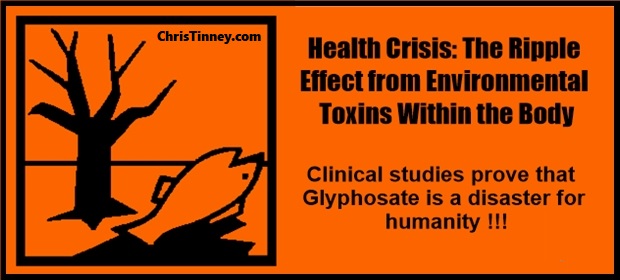
Toxins in the Environment
I always thought the problem with our food supply was much worse than we thought, but when I interviewed Caroline Kinsman of the NON-GMO Project, in 2015, I became much more concerned. That interview set me off on an investigation that has led me to investigate further, but before I could get deep into environmental toxins, I was overtaken by the proliferation of glyphosate. Glyphosate is the main ingredient in Roundup, the world’s most commonly used herbicide worldwide. I believe glyphosate is the number one challenge preventing people from living well.
Glyphosate has been identified by the World Health Organization, dozens of countries, and the state of California as a probable carcinogen. After you read this post I highly recommend you read my post on Biome Medic.
8 Toxins in the Environment you should know
1. Toxins Are Everywhere
A key fact that you should know is that toxins are everywhere. Toxins can be found in the food we eat (e.g. food additives, MSG, aspartame), the water we drink, the air we breathe (e.g. carbon monoxide produced by vehicles), and the chemicals used in all types of dairy products. While there is no way to avoid all toxins, you can do your part by avoiding toxins that come from smoking cigarettes and increasing your intake of natural whole foods.
2. Most Americans Are Polluted with Toxins
Unfortunately, research shows that the majority of Americans alive today carry over 700 toxins along with heavy metals. The high toxicity often found in older individuals implies that we are becoming more and more toxic as we age and come into contact with various toxins.
3. The Chemical Industry is Booming
Did you know that most of the chemicals that enter our lives every day are untested? Across the world, the chemical industry is booming with $3.7 trillion in annual sales. The United States comprises nearly 19% of the industry; however, these chemicals and their effects on our health remain untested. The effects that this large industry will have on the health of our population, in the long run, are completely unknown.
4. Toxins Are Hidden
Toxins are not something that you can see, smell, or taste. In fact, in a single day, most people face exposure to hundreds of unique synthetic chemicals. These are found most commonly in our personal hygiene products as well as food and beverages. To avoid toxins, do not use products with ingredients that you do not recognize and avoid processed foods.
5. You Can Afford Whole Foods
Whole foods may be more expensive, but it can save you a lot of money in long term healthcare costs. In addition, if the demand for such food rises, the supply will also grow, and natural products will ultimately become more affordable. Avoid processed foods now to preserve your health and help produce a future with more whole food at better prices.
6. Toxins Are Detrimental to Your Health
While many believe that toxins cannot be that harmful since they affect everyone, toxins have proven negative health effects. These include cancer, depression, multiple sclerosis, obesity, fibromyalgia, asthma, lupus, and many more. Avoiding toxins can help keep you safe from these detrimental diseases.
7. Change is Possible
Finally, the most important thing to keep in mind when it comes to toxins is that change is possible. You can avoid most toxins from foods by buying whole foods instead of processed junk. Pay attention to any ingredients that you don’t recognize. You can also use the sauna or do hot yoga to help detoxify your body. Working to eliminate toxins from your life and from your body will ensure a healthier future.
8. You Are Not Alone
There are people that – like you – want to live a toxin free life.
sources:
- http://www.chemicalbodyburden.org/whatisbb.htm
- http://lesstoxicguide.ca/?fetch=personal#dentu
- http://kblog.lunchboxbunch.com/2009/09/what-are-toxins-in-my-body-detox-101.html
- http://www.ehs.utoronto.ca/resources/whmis/whmis6.htm
